- Home
- Brian Spangler
Killing Katie Page 2
Killing Katie Read online
Page 2
By the time Snacks turned four, her hair had grown as long as mine, dark blonde with just enough reddish highlights that it can pass for red in the summer sun. But my baby girl’s face is nearly all Steve. I see him in her chin and lips and even her round cheeks. But I see my eyes in her eyes, an unmistakable deep hazel with a touch of green, like an emerald. I remember her fourth year because Steve had been promoted again, and the lost nights and weekends had become a little easier. On occasion, a criminal case would come across his desk that took him away from us. But by then, he’d staked out his office turf and learned the art of delegation.
I liked it when Steve brought home the popular cases—the ones that were on the evening news. He was never one who managed to work late into the evening. Not at home, anyway. I could always count on him falling asleep with at least a half-dozen case folders strewn open across our bed. That was my cue. That was my time to embellish some of my fantasies.
I gushed with anticipation whenever he fell asleep while working. Take a breath, I’d tell myself, trying to quell the urgent storm brewing in my mind. First, I’d open a bottle of wine, let it breathe before that first taste. Then I’d rush through each bedroom, silently making my way from bed to bed and tucking in the kids, kissing them goodnight. Next, I’d make sure Steve had no reason to get up. I’d pick off his round eyeglasses, place them on the nightstand. Sometimes, if he stirred, I’d rub his chest to coax him back to sleep. When I was sure the house was down for the night I’d carefully pull away the case files, clear the bed, and put them back together. But before putting them away in Steve’s briefcase, I’d secretly spend hours at our kitchen table, reading.
With a glass of wine in my hand and the silent murmur of our sleeping house, my heart would thump out of rhythm with each page turn. I loved the touch of the folders’ thick manila paper, the smell of the Xeroxed documents, and the smooth emulsion on the face of the crime-scene photos. I’d read every page and gaze at every photograph at least a half-dozen times. I’d even imagine myself as a hunter, prowling for my next victim, leaping like a cat, and pouncing, toying with a life.
On more than one occasion my studies had been interrupted, but I’d become used to it, expected it. I’d hear Snacks thumping down the steps, unable to sleep. I’d perch her on my lap and whisper sweetness into her ears while studying the case files. And as I’d finish with the cases, she’d tug on my shirt and hold her balled hands up, clutching at the air, wanting more to eat. She was closer to seven and growing faster and faster with each passing day. The mother in me still liked that she was needy, but I knew it wouldn’t last forever. And as I filled her carry-cup with her favorite cereal, I couldn’t help but wonder when Steve would have another set of case files. I hoped it would be soon.
THREE
“I DON’T WANT to be here,” Steve said grimly. I wove my arm through his and stepped onto the grass, my heels sinking into the soft earth. Steve braced me, letting me lean into him as we made our way over the carpet of green. “Thank you for coming.”
“Of course,” I answered softly, though I tensed a little, hurt that he’d felt he had to thank me. “John was my friend too. I’ve known him as long as I’ve known you.” He gave me a short nod and then struggled to say more, muttering words as grief hung over us, jabbing our senses at random moments.
The cemetery was solemn and absent of voices, leaving only the sound of jays and cardinals calling out while they skittered across the tops of tall evergreens lining the graves. A cloudless sky promised no rain on this sorrowful day, but broke in the center with the sun at high noon. The steely yellow eye watched while we slowly gathered to say good-bye to a friend.
And it was true. I’d known John for as long as I’d known my husband. I met them both on the same night, and at first, my eyes were for John. Tall and rugged, he was the best-looking man in the bar. Three drinks in, I knew I wanted him—until I saw Steve. And after meeting my future husband, I suddenly became blind to everyone else. Sounds sappy, but it’s true.
The memory of John’s sweet voice as he introduced me to Steve came back to me.
“Steve, this is Amy. Amy, Steve,” John had said, patting Steve on the back and gently nudging him closer. “It was nice talking to you, Amy. You can trust that Steve is a good guy.” But, after shaking Steve’s hand, I only vaguely heard John. He left us alone then. It had been just the two of us, lost in a sea of dancing and drinking and hopeful chatting as everyone around us tried to find the same thing we were in search of at that age. I swayed to the music as we traded a few opening lines, both of us hoping each line lead to another one.
“What kind of music do you like?” Steve had asked, winking at John. But John had already gone—lost to the attention of a gorgeous blonde who’d slowed and stopped before passing us.
“All kinds. But nights like tonight, I want to hear country the most,” I had answered, feeling the first nervous flutters that happen when I’m attracted to someone.
“Country!” he said, cocking his head and looking hot. “We’re a bit north for country music. Why tonight?”
“I like country songs best when I’m drunk—you know, a bit like now—sounds amazing when I can’t understand the lyrics.”
“So that’s the secret,” he answered, trying to appear surprised. “So you have to be drunk first.”
“That’s it!” I told him. I surprised myself when I quickly added, “Do you want to get drunk with me, Steve?” He had closed the distance between us and put his hand to my hip, joining me in my sway. “You’re so beautiful,” he said, looking at me as if I were the first woman he’d ever seen. The moment lifted me from the floor and put me into his life forever. “I’ll drink with you, Amy. I’ll even listen to country music with you.”
The pastor’s voice rose to a near shout, causing me to flinch and to tug on Steve’s arm. He lowered his head, bringing his mouth close to my ear. He whispered that he loved me. I nuzzled him back, saying the same without speaking a word.
I’d never confessed to Steve that my eyes found John first that night. I wanted to save that juicy tidbit for when we were old and sitting together on a rickety porch, spouting comical jabs at one another. I always thought of us as becoming that couple—older, with gestures and soft little sounds replacing words—cherishing one another.
John was Steve’s best friend. He became the brother I’d never had. I felt a warm sentiment come over me, only to have it disappear with the cold ache of the sudden loss. I had blamed John for the path Steve decided on—after all, he’d been first to suggest the police force as a career. They were inseparable, best friends, college roommates, taking the same classes. They reminded me of what Katie and I had—though I doubt Steve secretly fantasized about killing John. Over the course of one very trying weekend, Steve’s plans for law school ended. His new plans? Our new plans? Apply for the police academy along with John. Our future had changed, but I supported him because I loved him. I was going to be the wife of a police officer. A cop’s wife—it still sounds weird when I hear those words.
And it was through the academy and then working on patrol that Steve and John became even more like brothers, sharing an understanding that I could never be a part of. I spent many nights jealous of another man, yet I’d always felt better knowing that they were together. I thought they would be safer together than apart. They stayed tight even through the detective’s exam process, when they each received their shields. And though Steve had been promoted ahead of John, that didn’t matter to them. But their friendship, their brotherhood, ended when a bullet from a handgun entered John’s brain one rainy Friday evening while he questioned a suspect on a small felony charge. Compared to the life of a man, the charges were insignificant. I think that is what hurt the most about John’s death—the meaninglessness of it.
We entered the small circle of family and friends gathered around John’s casket, which had been placed above an open grave. A flag was draped over the sadly beautiful reddish maple, sturdy and ma
sculine, much like John. His wife, Charlotte, lifted her chin, her eyes red and puffy. She was still as strikingly beautiful as the night John had met her—we were there for that occasion. She acknowledged Steve’s presence and then mine as she pulled their children closer to her. A small boy and girl just a few years older than Snacks. They swung their feet from their chairs, looking afraid and confused and not at all understanding that their father lay dead a few feet away.
Charlotte motioned to me. I left Steve’s side and walked around John’s casket to take her in my arms. There were no words, no glances back and forth, no trying to understand something as impossibly unfair as her husband’s death. I felt the rise and fall of her chest against mine, her breathing ragged.
“Going to mess up my face again,” she whispered. “Crying has got me exhausted.”
“You stay strong,” I told her, uncertain if that was the best I could do. “For them.” I reached out, touching each of John’s children, their upturned faces nearly empty, a bemused expression coming to the oldest girl.
“I will, I will,” she said somberly as she sat back down. She held my fingers for a moment, giving them a squeeze before letting go. The touch was heartfelt and pained me. If I could have, I would have whisked her away from the nightmare she was living. By the time I was back and holding my husband’s arm, Charlotte’s posture had become rigid like a statue, unmoving. She looked as if she had been placed there like a stage prop in some horrible play. I suppose I’d shut down too if it had been Steve instead of John.
Charlotte and I had been close, on and off—in only a way a cop’s wife best understands. I didn’t get it at first, that is, why we’d forced some distance into our friendship. But standing on the soft grass of the cemetery, I finally understood. Other than Katie, I never had a close friend. The kind of girlfriend I’d tell everything to, say anything to, and never feel the pinch or sting of being judged by. John’s wife and I almost got there, very close, in fact. But it never lasted. At times I could feel the excitement between us, like a young couple fresh and eager to explore and learn every intimate detail about each other. We’d have weeks of playdates for the kids, a girls’ night out, and long conversations while drinking afternoon tea or wine. But whenever we approached that true closeness, we’d abruptly stop, the intensity fizzling like spent fireworks. The phone calls and long conversations would stop. Get-togethers went unscheduled, leaving blank spaces in our calendars and day-planners. Even the funny back-and-forth chatter about all the things that John and Steve did wrong came to an end. I always thought it was me, because I’m different like that, one to quickly shed people once I’d lost interest. But standing at her husband’s grave, I knew it wasn’t me. It was us. It was who we were.
When the circle around John’s casket was complete, Steve became rigid too and his breathing deepened and sounded shaky. The sudden anguish of seeing John’s casket, of seeing the open grave must have hit him. Tears pricked my eyes. I held onto him, trying to abate his pain. I loved John, but I hurt for my husband. When Steve graduated from the academy, I’d mentally begun preparing for a day like today. Priming my mind and building up a false emotional cushion to help absorb the shock of it. But when I thought of Snacks and Michael not having their father around . . . no amount of preparation would help. I shook my head at the idea of Snacks walking down the aisle alone or of Michael leaving for college without his father to see him off.
A million sad thoughts crossed my mind, but one screamed at me: That could’ve been Steve. I searched the familiar faces. Husbands and wives that I’d talked to over the years at fun gatherings, barbecues, and birthdays. The wives and I passed wet glances, each secretly thankful that our husbands were still standing next to us. Seeing their mournful faces and teary eyes finally did me in. It was my turn to cry. I gripped Steve’s arm, clutching until he pulled me closer.
“It’ll be okay,” he whispered into my ear. The touch of his breath sent a chill into me. I knew that he was wrong. It would never be okay—not as long as he was still on the street, working. “Love you, babe.”
“Love you too,” I answered, resenting who we were. I added, “I’m thinking of Snacks and Michael and what we’d do without you.” He let out a long sigh and tried to hide his emotion. When I saw the wet cutting into Steve’s cheek, I wiped one of the tears away but left the other alone. That one was for the kids, a reminder to him of who he’d be leaving behind if that bullet had found him instead.
The pastor began the final part of the ceremony, citing passages from the Bible and allowing those who wanted to speak at the time to say their parting words. Soon after, the flag was taken from atop the casket in a ceremony of folding and presentation to John’s wife. It was also a signal the gathering was about to end. The sound of soft cries and sniffling came then, as we realized that John’s time among us was really over. I shuddered. I wanted to go back to our car, but held onto Steve. For only the third time in our life together, he cried. And it wasn’t an errant tear having escaped the impatient swipe of his hand.
He knelt down and pressed his hand firmly on top of the casket.
“Good-bye, John. Till next time, brother . . .” he managed to say. His voice broke when he tried to say more. I draped my hand over his back and cried with him as others came forward to do the same.
When the pastor signaled, each of us put a flower on the casket. As the crowd took leave of the gravesite, we stayed. Steve insisted, telling me that he wanted to watch them lower John’s body into the ground. A few others stayed behind too, waiting for the end to come. Steve left my side to pick up a fistful of dirt when the workers began to lower John. “Ashes to ashes and dust to dust,” he mumbled as he released the handful, tossing it into the grave.
The dirt clods knocked against the casket, ringing out a truth I’d tried desperately to ignore. The sound brought to me the dread and fear of having to say good-bye to my own husband forever. We sobbed and said little until we were back inside our car.
“I know what you’re going to say,” Steve began, trying to clear his throat of emotion. I shuddered and dabbed my eyes. “That’s not going to happen to me.” His words were like stings. I raised my hand to him, shutting him up before he could say any more.
“You can’t say that,” I told him. In my head, I saw Michael and Snacks again, which fed my fear like a dangerous wind fanning a flame. “I don’t want to bury you. Don’t you get that?” I wanted to say more, but felt drained. His eyes were solemn and apologetic—and every bit as beautiful as the day I’d first gazed into them.
“What do you want me to do?” he asked, shaking his head. “You know you’re married to a cop. I’m good at it. I love my job.”
I swiped at my nose, annoyed.
“Are you better at it than John?” I asked, knowing the words stung. He winced. “Oh, I’m sorry . . . better than John was?”
“Amy, please!” he shouted, shaking his head.
I desperately wanted to apologize, but couldn’t. There were times when I reveled in my stubbornness. I could be a bitch when I wanted to. I hated that about myself.
“What about law school?” I said, taking his hand and feeling bad about what I’d said and how I’d said it. “When we were in college, that’s what you were going to do. Remember? Become a lawyer. Go to work for the district attorney. Make a difference.”
Steve looked past me, finding the grave where his best friend lay as cold as the ground he’d been lowered into. Dead.
“Can’t do that. Not now,” he said glumly and pitched his head down. “Too much at stake. You, the kids, the house. Can’t just up and go back to school—”
“Why not?” I interrupted. “There are a lot of lawyers who started out doing something else.” His hand stayed on mine, rubbing tenderly and trying to console. I yanked my arm back, realizing that he was dismissing me.
“Babe, come on.”
“Just go,” I demanded. “You won’t even listen.”
“It isn’t that I don’t w
ant to. Do you even know how expensive law school is?” he asked. I resented his tone. “We don’t have that kind of money.”
“What if I were working?” I asked. “What if I could pay for law school? What if I could pay for more than just school?” Steve heard me. The idea of him being off the streets eased the tension. I simply had no idea how to make it work, but I knew that I had to try. My cheeks were tight from crying. Selfishly, I wanted this to be over.
“Let’s talk about this later,” he answered. “Oh, and the answer is no.”
“No? To what?” I asked, confused.
“I wasn’t better than John,” Steve said, tears welling in his eyes. “He was the best cop I ever knew.”
FOUR
AS I SAT in my car and stared at my mother’s house, my childhood window looked peculiar. Different. Painted in the pale shine of unfamiliar sunlight. Growing up, I always had the shade of a giant oak. My father’s tree, a protector by day and guardian at night. But now my guardian was gone, amputated from our yard. And in its place I found a horrific scar in the ground the color of honey-red tinder. It bled sap and smelled sweet from the fresh-cut sawdust. The sight of it killed my spirit a little and made me feel sad, like seeing a pretty flower that had been shamelessly yanked up and then discarded.
With the tall oak gone from the yard, I’d driven by my mother’s house twice before realizing it. If not for Michael calling out to say that we were there, I would have never slowed the car. I frowned when Snacks careened over the piles of sawdust and then stomped her feet on sap oozing from a woody knot.

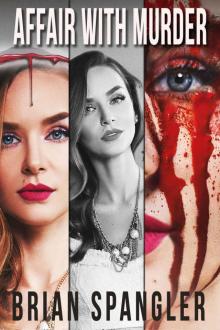 Affair with Murder The Complete Box Set
Affair with Murder The Complete Box Set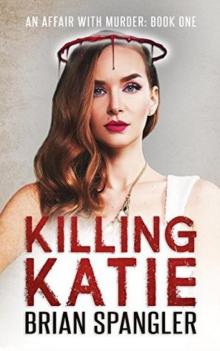 Killing Katie
Killing Katie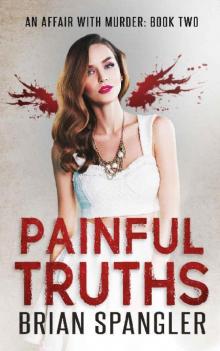 Painful Truths
Painful Truths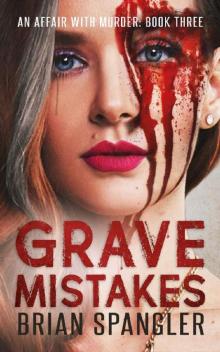 Grave Mistakes_A Deadly Vigilante Crime Thriller
Grave Mistakes_A Deadly Vigilante Crime Thriller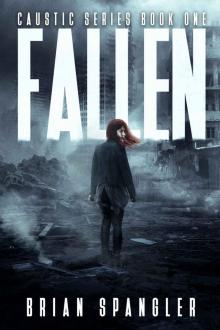 Fallen: Post-Apocalyptic Dystopian Thriller - Book 1 (Caustic)
Fallen: Post-Apocalyptic Dystopian Thriller - Book 1 (Caustic)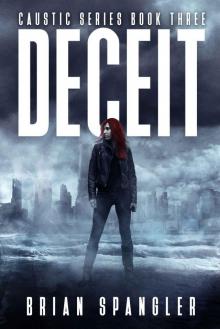 Deceit: Post-Apocalyptic Dystopian Thriller - Book 3 (Caustic)
Deceit: Post-Apocalyptic Dystopian Thriller - Book 3 (Caustic)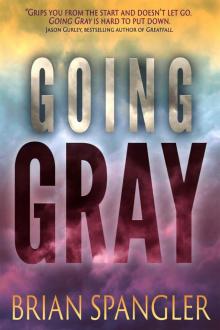 Going Gray
Going Gray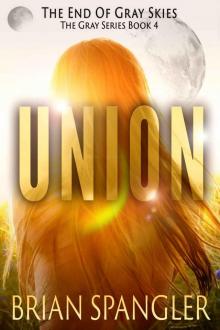 Union
Union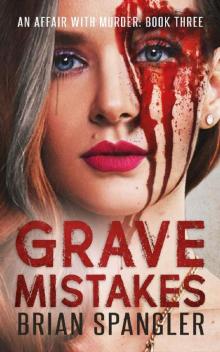 Grave Mistakes: A Deadly Vigilante Crime Thriller (Affair with Murder Book 3)
Grave Mistakes: A Deadly Vigilante Crime Thriller (Affair with Murder Book 3)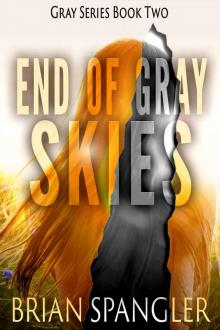 End of Gray Skies: An Apocalyptic Thriller
End of Gray Skies: An Apocalyptic Thriller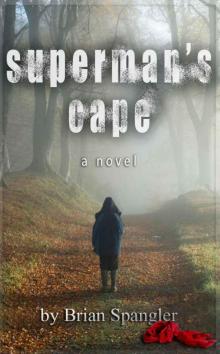 Superman's Cape
Superman's Cape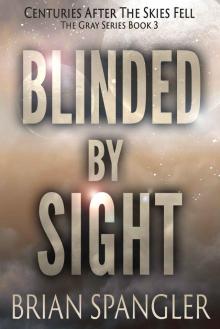 Blinded By Sight (Gray Series Book 3)
Blinded By Sight (Gray Series Book 3)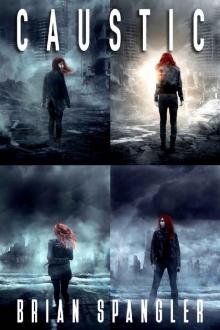 The Complete Four-Book Box Set
The Complete Four-Book Box Set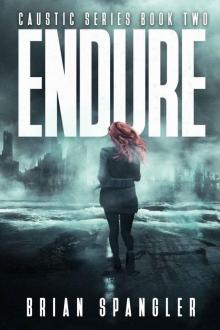 Endure: Post-Apocalyptic Dystopian Thriller - Book 2 (Caustic)
Endure: Post-Apocalyptic Dystopian Thriller - Book 2 (Caustic)